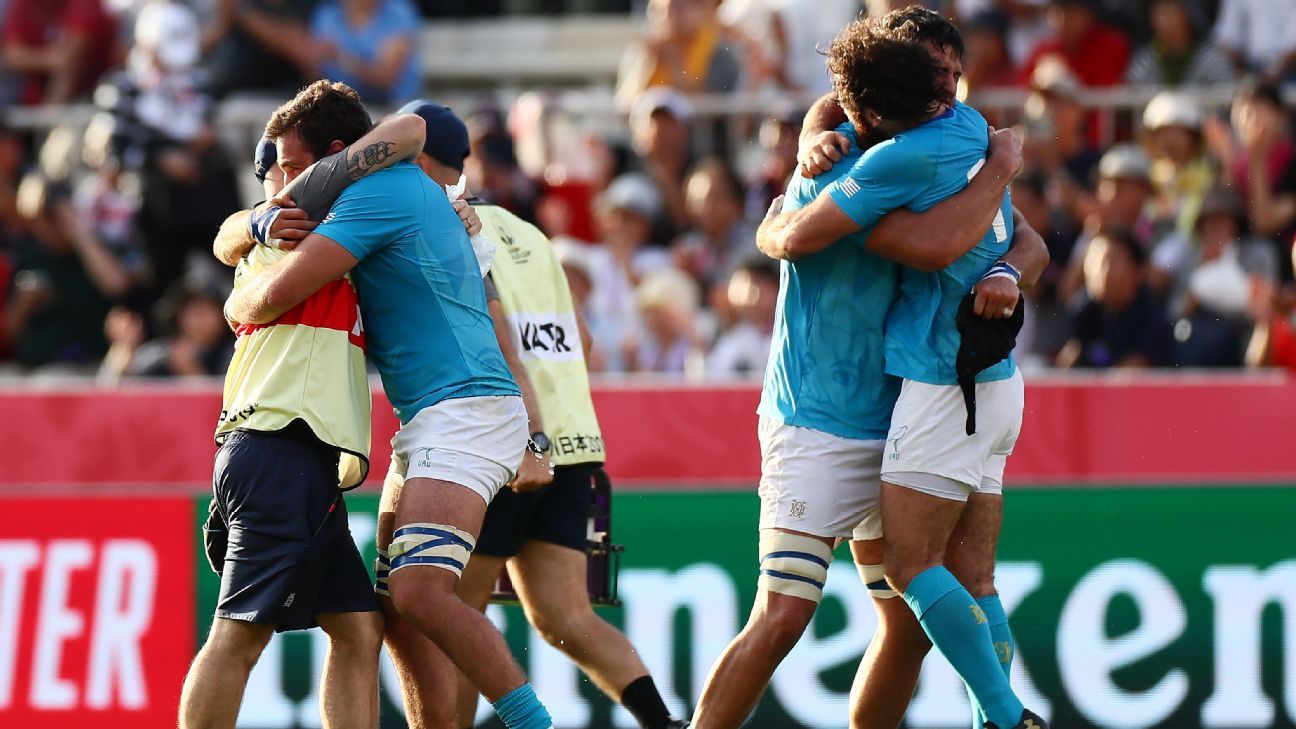KAMAISHI, Japan — Uruguay’s historic 30-27 win against Fiji in their opening Rugby World Cup match didn’t happen by chance; it was the result of a process Los Teros started off four years ago, after the 2015 RWC, when they suffered an overwhelming 47-15 defeat against the same team.
Once their RWC 2015 experience ended, the Uruguayans plunged into a process of rebuilding and professionalisation with the support of World Rugby and Argentina. In December 2015, Esteban Meneses was presented as head coach, and Pablo Lemoine as Director of the Centro Charrua, a state of the art training facility for all national teams.
Daniel Hourcade, the Pumas head coach at the time, was present at the press conference, a symbol of the Uruguayan team’s search of a new identity. One of their players, Nicolas Freitas, was invited to train with the Jaguares, the Argentine team that had been assembled to play Super Rugby. And two Uruguayan teams participated in Argentina’s Torneo del Interior (a competition for provincial teams, who do not play in the strongest league, Buenos Aires URBA tournament).
World Rugby also promoted their development with the creation of new tournaments, which were instrumental for Uruguay to get increased competition and strengthen their team. The creation of the Americas Rugby Championship provided a means of playing competitive continental matches. Argentina won the first edition, a six-team tournament in which Chile, Brazil, Canada and the United States also participating. The championship takes place annually, and each team faces their opponents once.
Uruguay had identical outcomes between 2016 and 2018: three wins in five matches, with defeats against Argentina -every year- one loss against Canada and the rest against the U.S. But in 2019 they pulled their first shocker with their first-ever away win against the Eagles and a record second-place finish.
They also played the Nations Cup against teams from other continents with excellent results: nine wins and three losses in 12 matches. They prevailed against Emerging Italy, Romania, Spain, Russia, Fiji Warriors, and, most notably, Argentina XV, twice. They suffered two of their three defeats in their first matches; against Emerging Italy and Romania in Bucharest.
In 2017, the competition moved to Uruguay, and from then on, they started an incredible spell with only one loss: 30-28 against Namibia in the latest edition. Nevertheless, they recovered later with a win against Argentina XV in the last match, becoming champions for the third time at home.
In order to be duly prepared for the competition, they assembled a professional staff which, besides the head coach, was helped by Argentine lineout and kicking coaches, and British physical trainers. Many other players went to the US professional league: Juan Echeverria, Ignacio Dotti, Alejandro Nieto, Gaston Mieres and Andres Vilaseca. And other three gained experience in France: Agustin Ormaechea at Stade Montois, Manuel Leindekar at Oyonnax and Felipe Berchesi at Dax.
“The players gave everything they had,” was the first reflection by Meneses, still the head coach (Lemoine left in 2017) after the win against Fiji.
0:55
Fiji’s head coach John Mckee commends Uruguay’s passion and ability to capitalise on errors made by his team.
0:55
Fiji’s head coach John Mckee commends Uruguay’s passion and ability to capitalise on errors made by his team.
0:55
Fiji’s head coach John Mckee commends Uruguay’s passion and ability to capitalise on errors made by his team.
“We came focused on one objective and we made it,” added Manuel Diana, one of the try scorers against Fiji.
The aim for RWC 2019 was to keep on adding victories, something that hasn´t been easy for Los Teros at World Cup level. In 1999 they had their first experience: they fell 43-12 against Scotland, 39-3 against South Africa and finally celebrated a victory against Spain 27-15.
In 2003, they showed themselves to the world again, but a difficult pool stage didn´t make things easy: they were first thrashed by South Africa by 72-6, then suffered a 60-13 loss against Samoa, added a relieving victory against Georgia 24-12 and left with a resounding defeat by England 111-13.
In their last participation, in 2015, they lost all their games: 65-3 against Australia, 60-3 against England, 54-9 against Wales, and the aforementioned loss against Fiji by 47-15.
In order to qualify to RWC 2019, they faced Canada and beat them home and away: 38-29 in Vancouver and 32-31 in Montevideo.
Their first challenge in this World Cup was Fiji and the result in their last clash was far from encouraging: on November 17th 2018, they fell 68-7. Less than a year later, in the most important tournament of all, they had their revenge.
This was absolutely huge for them and their scrum-half Santiago Arata summed it up this way: “I still cannot believe it, I think about the team and that everything is possible, and I know we can also win more games.”
Now they´ll go for a major goal: If they beat Georgia next Sunday, they will qualify for the next World Cup. After that, they will face Australia and Wales in the pool stage and they will have the difficult mission to try and win one of those matches and dream about the quarterfinals.
